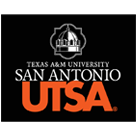Document Types
Panel
Location
Texas A&M University-San Antonio | Vista Room B
Start Date
2-22-2024 2:00 PM
End Date
2-22-2024 3:00 PM
Track
Culture and Pedagogy
Abstract
In an effort to provide culturally and linguistically relevant Spanish as a Heritage Language (SHL) programs in the United States, several language programs have turned to creating digital language learning and teaching materials using various data sources, digital tools, methodologies, cultural practices, digital humanities platforms and projects, as well as Open Educational Resources (OER). This facilitates innovative knowledge production that preserves local translingual and multilingual cultural heritages and identities of Spanish HLLs from multiracial backgrounds in the US in analog and online spaces. Current initiatives in multilingual, decolonial, postcolonial Digital Humanities (DH) are pushing back against the aporias in the digital age through ethical production and representation of subjects, cultures, languages and stories that have been othered, marginalized, excluded or misrepresented (Risam, 2019: 141). Furthermore, SHL sociolinguists encourage the development of critical language and cultural awareness among Spanish HLL student populations. This approach allows students to “develop a consciousness of the political, social, and economic power structures that underlie language use and the distribution of the so-called prestige and non-prestigious varieties” and “validate(s) and express(es) the diversity of students’ cultures, including US-based heritage cultures” (Beaudrie & Wilson, 2022: 67). With this in mind, in this panel, experts in the fields of SHL, DH and OER will present an OER for introductory SHL classes that connects learning and teaching materials using digital technologies and tools while also centering personal, local, and regional cultural community knowledge of South Texas to encourage production of their own stories and resources in the digital cultural record and an appreciation and preservation of their trans and multilingual identities and cultural heritages. Additionally, this panel will discuss the steps being taken by the R1 HSI university funding the development of this OER to infuse open pedagogy principles across disciplines in order to cultivate deeper student engagement.
Recommended Citation
Gonzalez, Stephanie; Fernández Quintanilla, Sylvia; Martínez, Glenn; and Ivie, DeeAnn, "Approaches of Digital Pedagogies for the Appreciation and Preservation of Local Trans and Multilingual Cultural Heritages" (2024). 11th National Symposium on Spanish as a Heritage Language. 4.
https://digitalcommons.tamusa.edu/heritage_spanish/SCHEDULE/Thursday/4
Included in
Digital Humanities Commons, Other Spanish and Portuguese Language and Literature Commons, Scholarly Publishing Commons
Approaches of Digital Pedagogies for the Appreciation and Preservation of Local Trans and Multilingual Cultural Heritages
Texas A&M University-San Antonio | Vista Room B
In an effort to provide culturally and linguistically relevant Spanish as a Heritage Language (SHL) programs in the United States, several language programs have turned to creating digital language learning and teaching materials using various data sources, digital tools, methodologies, cultural practices, digital humanities platforms and projects, as well as Open Educational Resources (OER). This facilitates innovative knowledge production that preserves local translingual and multilingual cultural heritages and identities of Spanish HLLs from multiracial backgrounds in the US in analog and online spaces. Current initiatives in multilingual, decolonial, postcolonial Digital Humanities (DH) are pushing back against the aporias in the digital age through ethical production and representation of subjects, cultures, languages and stories that have been othered, marginalized, excluded or misrepresented (Risam, 2019: 141). Furthermore, SHL sociolinguists encourage the development of critical language and cultural awareness among Spanish HLL student populations. This approach allows students to “develop a consciousness of the political, social, and economic power structures that underlie language use and the distribution of the so-called prestige and non-prestigious varieties” and “validate(s) and express(es) the diversity of students’ cultures, including US-based heritage cultures” (Beaudrie & Wilson, 2022: 67). With this in mind, in this panel, experts in the fields of SHL, DH and OER will present an OER for introductory SHL classes that connects learning and teaching materials using digital technologies and tools while also centering personal, local, and regional cultural community knowledge of South Texas to encourage production of their own stories and resources in the digital cultural record and an appreciation and preservation of their trans and multilingual identities and cultural heritages. Additionally, this panel will discuss the steps being taken by the R1 HSI university funding the development of this OER to infuse open pedagogy principles across disciplines in order to cultivate deeper student engagement.

